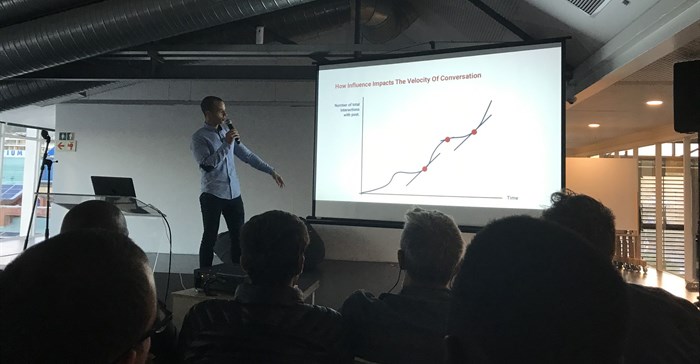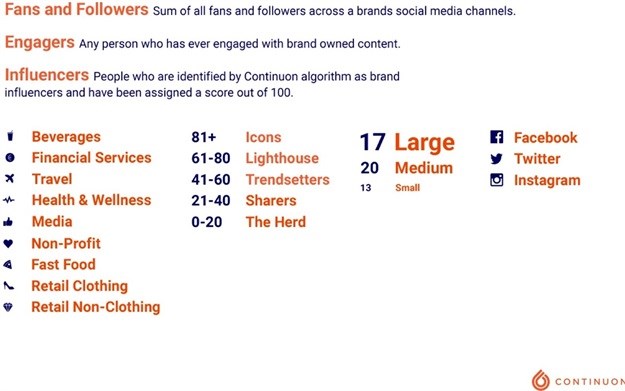
World's first social influencer survey results reveal the power of authentic online influence

The social intelligence company spent three months tracking the results. Fifty major brands participated in the study, where they analysed over 100-million data points, through three of the biggest social networks, which is Twitter, Facebook and Instagram, across nine different categories.
After JHB, Heavy Chef was in CT last night. @workshop17ct was fully packed to hear @BradElliottSA @HeleenMills and @DaveDuarte on influencer marketing. Thanks to our exceptional speakers and to our awesome sponsors for making this an amazing event. #heavychef #heavychefevents pic.twitter.com/3jtDmzG4k0
— Heavy Chef (@heavychef) March 16, 2018
They identified 5.25 million unique engagers across 50 brands. South Africa has about 60 million people, which means that almost 10% of people who have engaged with these brands in the social media space in the last three months. Also, 355,000 unique influencers were identified.
He said Continuon was formed because they believe that there are two major things happening in marketing and digital marketing as a whole.
"One, there is a huge breakdown of trust between brands, media, government and humans. Secondly, digital has forever disrupted the way the world engages with brands.""What we're seeing is a fundamental breakdown of trust between brands and people and we believe that by using data, and particularly social data in this instance, we can start forging better connections between brands and people and truly start to understand people's behaviour, understand their interests."
Elliott also said as marketers, advertisers and businesses we have become masters of our own demise. We've abused that relationship in the past where people have passed a piece of data or personal information on to us and we've used it to send them spam, etc. So what they're trying to do is make marketing authentic again.
The quality of influence between brands
In this case, the Continuon team looked at social data and influencership. Elliott said that a lot of people in the audience will probably define or think of influencers as celebrities, online influencers and micro influencers. But what they are looking at are brand influencers.
He explained that brand influencers are people within a brand's social media community that carry influence. These people don't know that they're influential. They don't want to be influencers. They don't want to be paid for putting out products or brand posts. They just engage with the brand because they truly have a strong affinity towards it. That's really something that we have to keep in mind while going through all of the research, he said. They looked at ordinary people that carry a lot of influence within a particular brand in a social media community.
What are influencers and engagers?
Elliott then went through a few definitions with us. "What are engagers?" He explained that people who have engaged with a piece of content that a brand has put out might not necessarily be a fan or a follower. Often brands target audiences that aren't sitting inside the brand's social media communities. So often you might have more engagers than you would have fans or followers.
"What are influencers? Influencers are people that can carry velocity of conversation within a brand community," he explained. What they believe is that the metrics that we typically use as marketers are really skewed. He said we tend to talk about reach, we tend to use pay influencer strategies, we tend to go, 'How many followers does this person have?' And that is what we as marketers define as successful. We think that this person has 100,000 followers, therefore, they've got clout, they've got reach. But what they're saying is that there should be other metrics outside of reach that comes into play.
Relevance and resonance over reach. Fans and followers aren’t everything #heavychef pic.twitter.com/Ps005RsUMa
— Mari Sciarappa (@mari_sciarappa) March 15, 2018
Elliott said resonance is the ability to drive someone to action and to drive an action from someone. Relevance is how relevant you are within your circle or sphere above influence. "So, if we talk about the velocity of conversation, we're talking about resonance. When I engage with a piece of content that a brand has put out, velocity of conversation is how much resonance that carries," he explained.
Ultimately, Continuon's algorithm identified people as brand influencers and scored them between 0 and 100. The research also looked at 17 large brands, 20 medium brands and 13 small brands. They put influencers into brackets, which saw anyone with a score of 0-20 being placed in the 'herd' bracket, anyone who scored between 21-40 was called 'sharers' and so forth. What they found was that the shape of these communities tends to look like pyramids. So very big herd bases and very small icon bases at the top. See image below.

We need a new vocabulary for influence
Reach is dead. However, quality reach is still important. Velocity of conversation is the fuel. #continuon #heavychef #Digital #social pic.twitter.com/Eqr64GRToP
— Edge Digital (@EdgeDigitalSA) March 15, 2018
- Reach is dead. Elliott explained that the most important thing one should remember when one looks at all of this data/research is that reach is still a very important metric but reach as we define it, is dead. The definition of reach at the moment is fans and followers or eyeballs. What we're saying is quality reach is still important. He said, "Quality reach is 300 people see my content and 299 engage with it. That is quality reach."
- Resonance and relevance is the new currency. These are the things marketers should be looking at and should be trying to measure.
- Velocity of conversation is the fuel in all of this. "I may not have a lot of friends and followers but it doesn't mean that I can't carry influence," said Elliott.
- New measures will start to emerge. "We are really just scratching the surface with this research. We are looking at just social data but when we start tying in other data sources, from CRM to purchase behaviour, we can really start getting a really deep understanding of people. And you can start understanding how to change behaviour because that is really what influence is about. It's about changing people's behaviour."
Key takeouts
Elliott ended his presentation by going through some key takeouts that came out of the research:
- There is more to influence than reach and followers/fans. Brands have thousands of authentic brand influencers in their own social media communities that they should and could be leveraging.
- Engagement is important, however, it does not always equal influence. However, all categories have people that engage heavily with content that shouldn't be ignored.
- The considerable variation across categories with regards to overall influence scores and number of authentic influencers is less of an indication of how categories perform in social. Strategy still reigns supreme.
- Social is now considered a pay-to-play space - the biggest budget wins. This is not true - smaller brands and brands in 'unsexy' categories have shown they have powerful, authentic influencers to leverage regardless of budget.
- Social data is the first layer of behavioural data that can be leveraged to gain true insight into authentic brand affinity/advocacy.
To download the research, click here. For more on Continuon, visit their website, click here for more on Elliott and here for more information on upcoming Heavy Chef events.
About Juanita Pienaar
View my profile and articles...